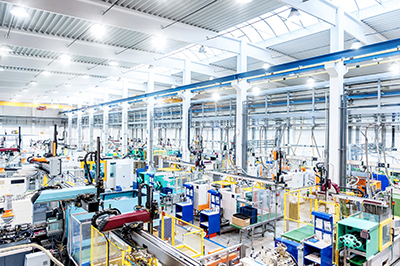What is Connected Manufacturing and What are the Benefits?

The Industry 4.0 rollout is a top priority for many companies as they look to connected manufacturing to solve problems that plague their production facilities. Unprecedented levels of automation, digitization, and data integration may not only fix issues on the assembly line but can improve the customer and employee experience.
What Connected Manufacturing Has to Offer
Connected manufacturing makes use of integrated sensor networks that are expected to increase uptimes, reduce operational cost, and improve quality of service. Mobile and web applications allow businesses to automate equipment inspections, schedule maintenance, and report information like temperature readings and malfunctions in real-time.
Artificial Intelligence (AI) particularly shows promise to revolutionize preventative maintenance schedules for manufacturers. Currently, OEMs create somewhat general schedules for the replacement of moving parts that wear out over time. Connected manufacturing can use AI and machine learning to more reliably determine when parts will need to be replaced. It can even automate the ordering of parts in advance and schedule downtime when it will least impact production.
On-demand production is yet another benefit of connected manufacturing. In the past, manufacturing facilities had to produce large batches of a product mostly for efficiency. They often guessed at what demand would be weeks or months in advance. Inventory could sit idle in warehouses and distribution centers as a result. However, connected devices with built-in cloud analytics will allow companies to adjust production quickly based on real-time customer behavior.
Clearing up Confusion About Connected Manufacturing
Connected manufacturing isn’t just about making production faster and more efficient. Many businesses are rethinking their entire business models and hinging them on Industry 4.0. They’re hoping to use the data to break down the silos that separate the information and knowledge side of the business from the operations groups. The collaboration that may result will help them offer a full array of after-sales services throughout a product’s life cycle.
One trepidation that workers have about connected manufacturing is the risk of job loss but Industry 4.0 isn’t about replacing human workers at all. In fact, humans are at the center of the digital transformation. Businesses are already investing heavily in developing their staff to learn how to leverage these technologies for improving and optimizing work. That is one of connected manufacturing’s primary goals: to help automate and eliminate mundane tasks and let humans focus on more rewarding careers.
By collecting data, businesses with these systems hope to connect their people, processes, and supply chains via greater visibility, efficiency, and customer feedback. Detailed information can be captured in real-time and instantly reported to the facility, department, or even an individual team member. This data is especially valuable since it can help both management and staff finally appreciate exactly how their role directly impacts the organization’s success.
Learn how Industry 4.0 solutions from Genesis Systems can empower your team with the real-time and historical production data needed to grow your business.
Posted in Robotic Applications, Robotic Integration